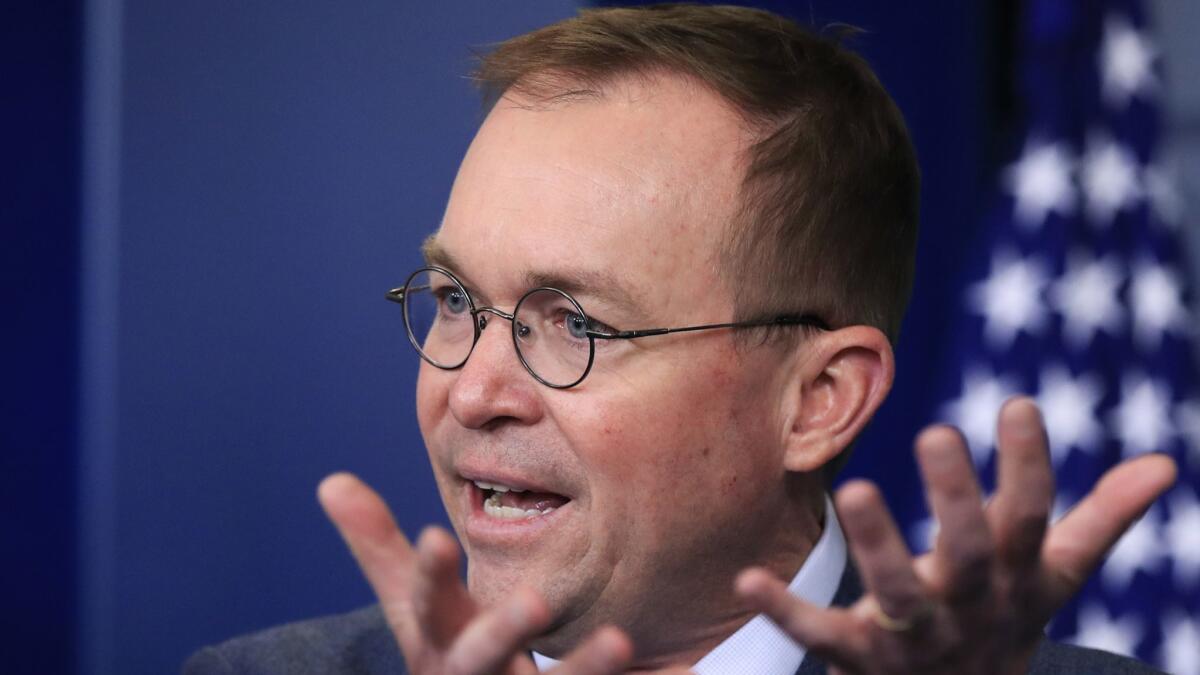Consumer protection bureau’s chief formally asks Congress to slash his agency’s power

The head of the Consumer Financial Protection Bureau formally called on Congress to sharply reduce his agency’s authority. Among the suggestions he delivered Monday: Any major new rules the bureau makes should be subject to lawmakers’ approval.
Mick Mulvaney — who has been an outspoken critic of the consumer protection bureau since before President Trump appointed him as its acting director last year — also wants Congress to change how the bureau is funded, make its director subject to dismissal by the president for any reason and create an inspector general specifically for it.
“The bureau is far too powerful, with previous little oversight of its activities,” Mulvaney said in submitting his first report to Congress.
“The power wielded by the director of the bureau could all too easily be used to harm consumers, destroy businesses, or arbitrarily remake American financial markets,” Mulvaney said as he sent the bureau’s semiannual report to lawmakers ahead of hearings next week, adding that the changes he proposed would “establish meaningful accountability.”
Consumer advocates criticized the proposals, which they said would take away the bureau’s independence. The agency was created in the wake of the 2008 financial crisis to consolidate financial consumer protection authority that was spread over several banking agencies. Regulators that existed at the time were criticized for making consumer protection concerns, such as subprime mortgages, a lower priority than the profitability of banks and other financial firms they oversaw.
Since opening in 2011, the bureau has provided consumers about $12 billion in refunds and debt relief from financial institutions. It also played a key role in penalizing Wells Fargo & Co. after the bank created of millions of accounts in customers’ names without those customers’ consent.
Mulvaney’s changes “would stab a knife through the heart of the CFPB’s mandate to protect consumers from financial industry abuses,” said Lisa Gilbert, vice president of legislative affairs for Public Citizen.
Ed Mierzwinski, consumer program director at the nonprofit U.S. Public Interest Research Group, said Mulvaney’s proposals were consistent with his other actions to weaken the bureau.
“He’s made it clear that he does not want a strong agency to protect consumers,” Mierzwinski said. “He wants a weak agency that payday lenders and Wall Street can run roughshod over.”
Mulvaney, who as a lawmaker called the bureau a “joke ... in a sad, sick kind of way,” has been working to remake the agency as its acting director. He has halted some enforcement efforts, changed the bureau’s mission statement to emphasize the need to address “outdated, unnecessary, or unduly burdensome regulations” and launched a review of its entire operation.
Among Mulvaney’s latest proposals is a long-sought Republican goal of ending the agency’s independent funding.
Instead of receiving money directly from the Federal Reserve, a cash flow designed to insulate the bureau from political interference, Mulvaney wants the funding to go through the congressional appropriations process. Republican critics of the bureau have been pushing for that change since the agency was created in the 2010 Dodd-Frank law, arguing it would provide more accountability.
The bureau’s supporters, including consumer advocates, argue that other financial regulators are funded outside the congressional appropriations process and that Republicans want the change to starve the agency of funding.
Mulvaney, a former Republican congressman who also serves as director of the White House Office of Management and Budget, highlighted the funding issue in January when he requested $0 for the bureau from the Federal Reserve for the second quarter of the fiscal year.
At the time, Mulvaney said that the bureau had enough money on hand to cover its anticipated $145 million in expenses for the quarter and that he planned to slash the bureau’s reserve fund.
Mulvaney also wants Congress to “ensure that the director answers to the president in the exercise of his executive authority.”
That request appears to be in response to a court ruling.
The U.S. Court of Appeals for the District of Columbia ruled 7-3 in January that Congress acted appropriately in mandating that the bureau’s single director — who serves a five-year term after being nominated by the president and confirmed by the Senate — can be removed by the president only for inefficiency, neglect of duty or malfeasance in office.
The decision reversed a 2-1 ruling in 2016 by a three-judge panel of the court that found that the bureau’s structure violated the Constitution’s separation of powers because it limited the president’s authority. That ruling said the solution was to strike down the law’s “for cause” provision, meaning that the president could remove the bureau’s director for any reason, as with other executive branch appointees.
Mulvaney’s final request is to set up a separate independent inspector general for the bureau. Currently, the Federal Reserve’s inspector general provides oversight for the bureau. That position is appointed by the Fed chairman. Although Mulvaney provided no details, he could want an inspector general for the bureau who is appointed directly by the president, which would give the White House more control of the oversight.
Mulvaney’s appointment as acting director is being challenged in court by Leandra English, the bureau deputy director who contends she is the rightful acting director. Richard Cordray, who resigned as director in November, appointed her as his temporary replacement. But Trump quickly put Mulvaney in the place-holder post.
A federal judge denied English’s request for a temporary restraining order and later a preliminary injunction to remove Mulvaney as acting director and install her instead. She is appealing the injunction denial to the U.S. Court of Appeals for the D.C. Circuit.
Twitter: @JimPuzzanghera
UPDATES:
3:20 p.m.: This article was updated with comment from Lisa Gilbert of Public Citizen and with additional details.
This article was originally published at 1:15 p.m.







